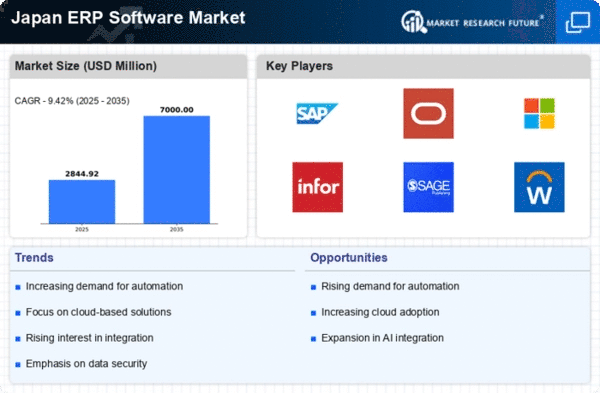Rising Demand for Customization
The erp software market in Japan experiences a notable rise in demand for customization. Businesses increasingly seek tailored solutions that align with their unique operational needs. This trend is driven by the diverse nature of industries in Japan, where companies require specific functionalities to enhance efficiency. According to recent data, approximately 60% of organizations express a preference for customizable ERP systems. This inclination towards personalization indicates a shift from one-size-fits-all solutions to more adaptable software. As a result, vendors are compelled to innovate and offer flexible modules that can be configured to meet individual client requirements. This customization trend not only enhances user satisfaction but also fosters long-term relationships between software providers and clients, ultimately contributing to the growth of The ERP Software Market in Japan.
Shift Towards Integrated Solutions
The erp software market in Japan is witnessing a significant shift towards integrated solutions. Companies are increasingly recognizing the value of having interconnected systems that streamline operations across various departments. This integration facilitates real-time data sharing, enhances collaboration, and improves decision-making processes. Recent statistics reveal that approximately 65% of organizations in Japan are actively seeking ERP solutions that offer seamless integration with other business applications. This trend is particularly pronounced in sectors such as manufacturing and retail, where operational efficiency is paramount. As businesses strive for holistic management of resources, the demand for integrated ERP systems is likely to continue growing, thereby influencing the trajectory of The ERP Software Market in Japan.
Increased Focus on Compliance and Security
In the context of the erp software market, compliance and security have emerged as critical drivers in Japan. With stringent regulations governing data protection and privacy, businesses are prioritizing ERP solutions that ensure compliance with local laws. The Japanese government has implemented various regulations, such as the Act on the Protection of Personal Information, which mandates strict data handling practices. Consequently, organizations are investing in ERP systems that incorporate robust security features to safeguard sensitive information. Recent surveys indicate that over 70% of companies consider compliance capabilities a key factor when selecting ERP software. This heightened focus on security not only mitigates risks but also enhances trust among stakeholders, thereby propelling the growth of The ERP Software Market in Japan.
Emphasis on User Experience and Accessibility
User experience and accessibility are becoming increasingly vital in The ERP Software Market in Japan. As organizations adopt ERP systems, they prioritize solutions that offer intuitive interfaces and easy navigation. This emphasis on user experience is driven by the need to minimize training time and enhance productivity. Recent findings suggest that around 55% of companies consider user-friendly design a crucial factor in their ERP selection process. Furthermore, with the rise of remote work, accessibility features that allow users to access ERP systems from various devices are gaining importance. This focus on user experience not only improves employee satisfaction but also contributes to higher adoption rates of ERP solutions, thereby positively impacting the growth of the erp software market in Japan.
Growing Importance of Data-Driven Decision Making
Data-driven decision making is increasingly shaping the landscape of The ERP Software Market in Japan. Organizations are recognizing the value of leveraging data analytics to inform strategic choices and optimize operations. This trend is underscored by the fact that approximately 75% of Japanese companies are investing in ERP systems that provide advanced analytics capabilities. By harnessing data insights, businesses can identify trends, forecast demand, and enhance overall performance. This growing reliance on data not only improves operational efficiency but also fosters a culture of informed decision-making. As companies continue to prioritize data-driven strategies, the demand for ERP solutions that facilitate these capabilities is likely to surge, further propelling the growth of the erp software market in Japan.
















